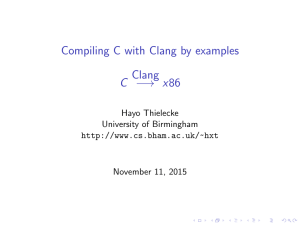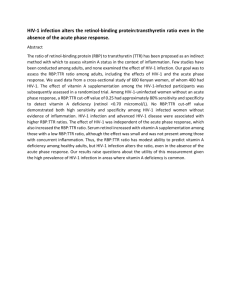More on code generaOon
advertisement
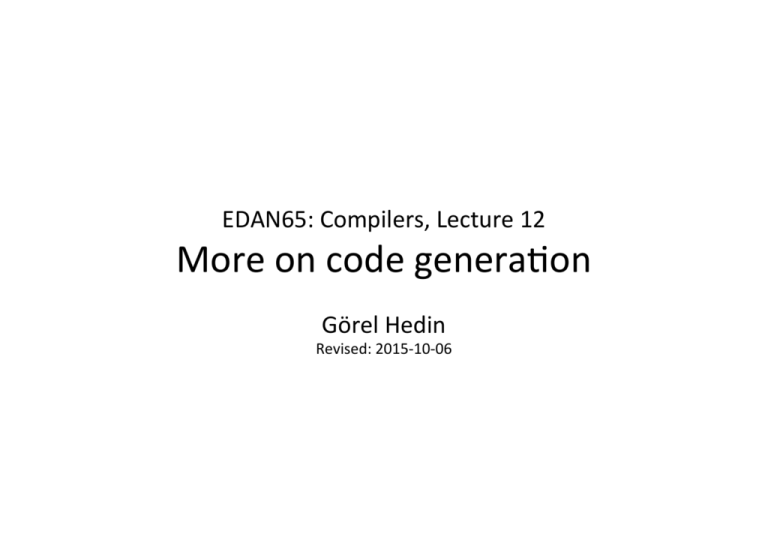
EDAN65: Compilers, Lecture 12 More on code genera>on Görel Hedin Revised: 2015-­‐10-­‐06 This lecture source code (text) Regular expressions
runtime system activation
records Lexical analyzer (scanner) stack tokens Context-­‐free grammar
Syntac>c analyzer (parser) garbage
collection AST (Abstract syntax tree) AQribute grammar
heap Seman>c analyzer objects AQributed AST Intermediate code generator Interpreter
intermediate code Op>mizer Virtual machine
code
and
data intermediate code Target code generator machine
target code 2 Genera>ng code AST Source code ADD a b t1 MOV t1 c c = a + b Intermediate code Assembly code movq 16(%rbp), %rax addq 24(%rbp), %rax movq %rax, -­‐24(%rbp) movq -­‐24(%rbp), -­‐8(%rbp) Intermediate code: • Where most op>miza>ons are done Assembly code: • For given machine, opera>ng system, assembler, and calling conven>ons In assignment 6 • Generate AT&T assembly code for x86-­‐64, using simple calling conven>ons • No intermediate code – we generate the assembly code directly from the AST. 3 AT&T x86-­‐64 assembly code stack grows Source code void m(int a, int b) { int c, d; ... c = a + b ... } lower addresses rsp Assembly code m: # Label for the method pushq %rbp # Push the dynamic link movq %rsp, %rbp # Set the new frame pointer subq $24, %rsp # Make room on stack for c, d, t1 ... movq 16(%rbp), %rax # a -­‐> rax addq 24(%rbp), %rax # b + rax -­‐> rax movq %rax, -­‐24(%rbp) # rax -­‐> t1 movq -­‐24(%rbp), -­‐8(%rbp) # t1 -­‐> c ... movq %rbp, %rsp # Move back the stack pointer popq %rbp # Restore the frame pointer ret # Return to the calling method rbp t1 d c dynlink retaddr a b ... dynlink higher addresses 4 Genera>ng code for different constructs Expression evalua:on, using temporaries, local variables, formal arguments Method call, passing arguments and return values Method ac:va:on and return, se_ng up a new frame, restoring it Control structures, labels and branching 5 Explicit temps (like in previous lecture) Source code a = b * (c + d) Variable addresses a -­‐8(%rbp) b -­‐16(%rbp) c -­‐24(%rbp) d -­‐32(%rbp) t1 -­‐40(%rbp) t2 -­‐48(%rbp) Main idea: • Each opera>on puts its result in a new temp Code genera>on for binary opera>on: • generate code for le` op (result at some address) • generate code for right op (result at some address) • move le` op to %rax • perform opera>on on right op and %rax • move %rax into new temp x86 assembly code, explicit temps movq -­‐24(%rbp), %rax # c -­‐> rax addq -­‐32(%rbp), %rax # d + rax -­‐> rax movq %rax, -­‐40(%rbp) # rax -­‐> t1 movq -­‐16(%rbp), %rax # b -­‐> rax imulq -­‐40(%rbp), %rax # t1 * rax -­‐> rax movq %rax, -­‐48(%rbp) # rax -­‐> t2 movq -­‐48(%rbp), -­‐8(%rbp) # t2 -­‐> a Code genera>on for assignment: • generate code for right-­‐hand side (result at some address) • move result to le` var Code genera>on for IdUse: • No code needed. 6 Stacking of temps an alterna>ve to explicit temps Source code a = b * (c + d) Variable addresses a -­‐8(%rbp) b -­‐16(%rbp) c -­‐24(%rbp) d -­‐32(%rbp) Main idea: • each expression puts its result in rax Code genera>on for binary opera>on • generate code for le` op (result in rax) • push rax • generate code for right op (result in rax) • pop le` op into rbx • op rbx rax (result in rax) x86 assembly code, temps on stack movq -­‐16(%rbp), %rax # b -­‐> rax pushq %rax # push rax movq -­‐24(%rbp), %rax # c -­‐> rax pushq %rax # push rax movq -­‐32(%rbp), %rax # d -­‐> rax popq %rbx # pop rbx addq %rbx, %rax # rbx + rax -­‐> rax popq %rbx # pop rbx imulq %rbx, %rax # rbx * rax -­‐> rax movq %rax, -­‐8(%rbp) # rax -­‐> a Code genera>on for assignment: • generate code for right-­‐hand side (result in rax) • move rax to le` var Code genera>on for IdUse: • move value into rax 7 Explicit or stacked temps? Code genera>on is simpler for stacked temps – we don't need to compute addresses for temps. But: to generate code for method calls, we need to evaluate the arguments from right to le`, to push them in the appropriate order on the stack. Not all languages allow this. If evalua>ng the arguments have side effects, the evalua>on order can make a difference. Some languages, like Java, define the evalua>on order on arguments from le` to right. In assignment 6, we will use stacked temps. (For SimpliC it is ok to evaluate the arguments from right to le`.) 8 Example code genera>on aspect CodeGeneration { public void Program.genCode(PrintStream s) { ... } public void Add.genCode(PrintStream s) { getLeft().genCode(s); s.println("pushq %rax"); getRight().genCode(s); s.println("popq %rbx"); s.println("addq %rbx, %rax"); } ... public void IdUse.genCode(PrintStream s) { s.println("movq " + decl().address() + ", %rax"); } ... } 9 Genera>ng code from the AST Define suitable node proper>es, using aQributes, to make the code genera>on easy. Then write the code genera>on as a recursive method, prin>ng the code to a file. What proper>es do we need? • The address of each variable declara>on, for example "-­‐8(%rbp)". • The number of local variables of a method (to reserve space on the stack). • The address of each formal argument, for example, "16(%rbp)". • Unique labels for each control structure. 10 Compu>ng addresses of declara>ons using aQributes Main idea: • Enumerate the variable declara>ons inside each func>on, giving them local indexes: 1, 2, ... • Transla>ng to the address is then simple: "-­‐8(%rbp)", "-­‐16(%rbp)", ... Func>onDecl List VarDecl While VarDecl locIndex = 1 locIndex = 4 Block List VarDecl locIndex = 2 Assign VarDecl locIndex = 3 How can locIndex be computed using aQributes? Impera>vely, it would be simple: traverse the tree in preorder, and give each VarDecl an increasing index. Assign 11 Compu>ng locIndex declara>vely Main idea: • Give all nodes a locIndex, the locIndex of the latest VarDecl in a preorder traversal. • Normally the same as for the previous node in the traversal. • But 0 for the root, and one more for each VarDecl. Func>onDecl syn int ASTNode.locIndex(); eq ASTNode.locIndex() = prev().locIndex(); eq Program.locIndex() = 0; eq VarDecl.locIndex() = prev().locIndex() + 1; locIndex=0 List compu>ng the number of locals VarDecl While locIndex=1 locIndex = 1 VarDecl locIndex = 4 Block syn int Func>onDecl.numLocals() = last().locIndex(); locIndex=1 List VarDecl Assign VarDecl Assign locIndex = 2 locIndex=2 locIndex = 3 locIndex=3 But how are prev() and last() defined? 12 Compu>ng prev declara>vely Preorder traversal: Visit the nodes in the order A, B, C, D, E, F, G Each node n has • a prev aQribute, the previous node in a preorder traversal. • a prev(i) aQribute, the previous node before traversing the i'th child of n. • a last aQribute, the last aQribute in a preorder traversal of the n subtree. A B C E D F G inh ASTNode ASTNode.prev(); eq ASTNode.getChild(int i).prev() = prev(i); syn ASTNode ASTNode.prev(int i) = i=0 ? this : getChild(i-­‐1).last(); syn ASTNode ASTNode.last() = prev(getNumChild()); E.prev() == A.prev(1) == B.last() == B.prev(2) == D.last() == D.prev(0) == D 13 Alterna>ve solu>on using a map aQribute • Define an aQribute syn HashMap<VarDecl, Integer> FunctionDecl.localsMap(); • Compute it by traversing the func>on with a method void addLocals(HashMap<VarDecl, Integer> map, Counter c) ... • Use the Root AQribute paQern to give each VarDecl access to the map, and let them look up their index. Func>onDecl localsMap<VarDecl, Integer> List VarDecl While VarDecl locIndex = 1 The addLocals method is impera>ve, but the side effects do not escape outside the localsMap equa>on, so that is ok. locIndex = 4 Block List VarDecl locIndex = 2 Assign VarDecl locIndex = 3 Assign 14 Compu>ng unique labels Main idea: • Give each statement a "pathname" rela>ve to the func>on. • E.g., 3_2 means the 2nd statement in the 3rd statement in the func>on. • Generate labels like m_3_2_whilestart and m_3_2_whileend void m(int a) { int x = 1; int y; while (a > x) { y = a*2; if (y > 3) { ... } } } m: ... m_3_whilestart: ... m_3_2_ifend: ... m_3_whileend: ... Compute the "pathnames" in a similar way as the unique variable names were implemented in assignment 5. 15 An example assembly program .global _start # global segment .data # data segment (for global data) ... .text # text segment (for code, write protected) _start: # execution starts here call fstart_main # call the main program movq %rax, %rdi # use the result as the exit code movq $60, %rax syscall # call system exit fstart_main: # pushing the frame for the main function pushq %rbp movq %rsp, %rbp subq $0, %rsp ... # the code of the main function fend_main: # popping the frame for the main function movq %rbp, %rsp popq %rbp ret fstart_p: ... fend_p: ... Generated by: Program node FunctionDecl node FunctionDecl node 16 What happens a`er compila>on? memory p.s source code
compiler assembly code
object code
stack objects heap p p.o assembler activation
records linker executable code
ld p.o –o p as p.s –o p.o library object code
• object code contains global symbols and relocatable addresses • in executable code global symbols and relocatable addresses have been replaced by absolute addresses EDAN65, 2014, Lecture 01 loader ./p ...
0000 0001
0176 0024
0024 7050
2530 0000
0000 0010
2444 5512
0000 0010
...
static
data code machine
17 Summary ques>ons • What informa>on needs to be computed before genera>ng code? • How do explicit temporaries work? How do stacked temporaries work? What are the advantages and disadvantages of these implementa>on techniques? • How can local variable numbers be computed using aQributes? • How can unique labels be computed? • What is the difference between a text and a data segment in an assembly program? • What needs to be done to run a program in assembly code? 18
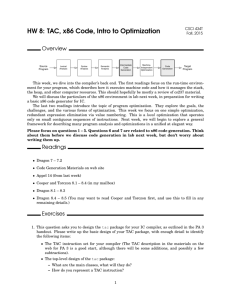

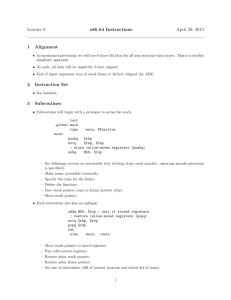
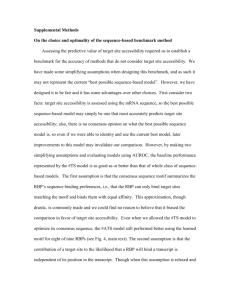

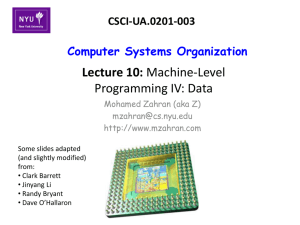

![Functions and stack frames [1em] C](http://s3.studylib.net/store/data/008386896_1-94be5e2fa109cec8a8beec0aa6c4b715-300x300.png)
